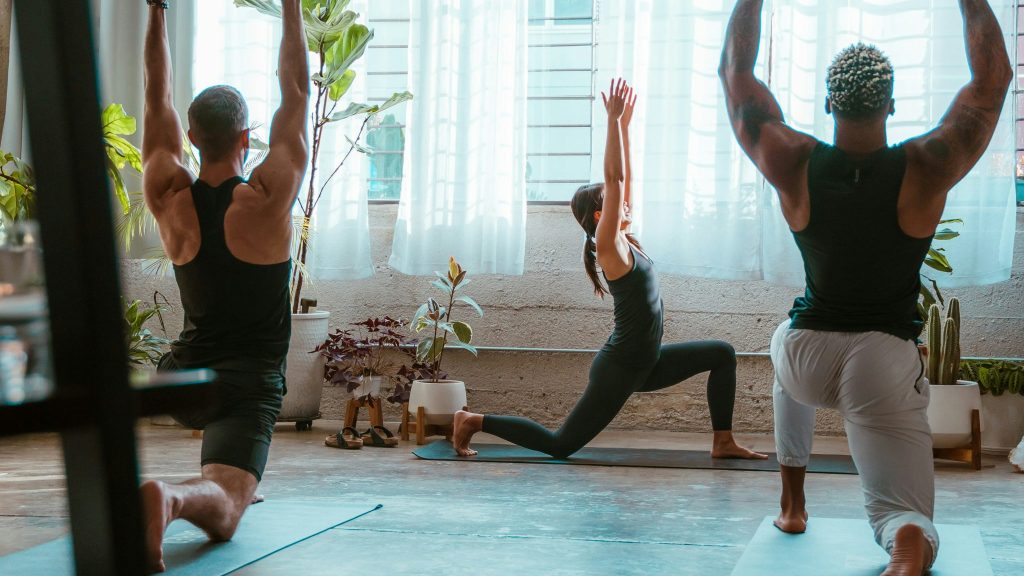Table of Contents
Today, health management integrates both mental and physical aspects to achieve holistic wellness. This comprehensive approach emphasizes the synergy between mind and body through exercises that enhance both physical capabilities and mental resilience.
Mind-body fitness, rooted in both ancient practices and modern scientific understanding, plays a critical role in this integrated approach. These exercises are designed not only to improve physical strength and endurance but also to foster mental health and emotional stability, making them essential for comprehensive health routines.
“Mind-body exercises, a cornerstone of holistic fitness routines, not only enhance physical capabilities but also bolster mental resilience and emotional stability.”
The effectiveness of mind-body exercises in achieving optimal fitness and mental clarity cannot be overstated. These practices are vital for those seeking to improve their overall health and performance:
- Introduction to Mind-Body Fitness: Understand the principles that guide mind-body exercises and their benefits for holistic health.
- Benefits of Yoga in Fitness Routines: Yoga improves flexibility, muscle strength, and mental well-being.
- Pilates for Core and Mind Enhancement: Pilates focuses on enhancing core strength and promoting mental focus.
- Meditation Techniques for Athletes: Meditation helps improve focus, reduces stress, and accelerates recovery in sports performance.
- Integrating Mindfulness into Workout Regimens: Incorporate mindfulness to enhance mental awareness and reduce stress during physical exercises.
By incorporating mind-body exercises into daily routines, individuals can enhance their physical fitness while also nurturing their mental and emotional well-being. This article serves as a comprehensive guide to understanding and applying mind-body fitness techniques, equipping readers with the knowledge to maintain a balanced approach to health that benefits all aspects of life.
Introduction to Mind-Body Fitness
Mind-body fitness integrates mental and physical disciplines to enhance overall health and wellness. This holistic approach emphasizes the importance of both physical and mental health to achieve optimal wellness, focusing on exercises that enhance physical capabilities while supporting mental resilience and emotional stability.
Mind-body Connection
The mind-body connection refers to the direct relationship between mental states and physical health. Research indicates that stress can significantly impact physical health, leading to conditions such as hypertension and fatigue, while a positive mental outlook can improve immune function and enhance overall well-being.
“Stress can lead to physical manifestations such as hypertension and fatigue, while a positive outlook can enhance immune function and overall well-being.”
Mind-body fitness incorporates practices like yoga and meditation, which aim to reduce stress and its physical effects. These practices improve physical flexibility and strength while promoting mental health, demonstrating the practical benefits of the mind-body connection.
History and Evolution
Mind-body fitness has roots in ancient traditions, evolving over thousands of years into the practices we see today. Originally developed for spiritual and mental growth, these practices have been scientifically recognized for their health benefits.
| Practice | Origin | Modern Adaptation |
|---|---|---|
| Yoga | Ancient India | Integrated into global fitness routines |
| Martial Arts | East Asia | Adapted for self-defense and fitness |
| Tai Chi | Ancient China | Used in therapeutic settings worldwide |
Today, holistic health principles guide modern mind-body fitness, blending ancient practices with contemporary science to improve both physical and mental health. This integrated approach is increasingly used in medical treatments and everyday wellness routines, highlighting its evolution and adaptability.
Foundational Principles
The principles of mind-body fitness emphasize balance, harmony, and the integration of mental and physical disciplines. These principles focus on practices like controlled breathing, mindful movements, and meditation, which are aimed at enhancing self-awareness and inner balance.
Practices such as Pilates, tai chi, and qigong exemplify these principles through their focus on slow, controlled movements that synchronize with breathing and mental focus. This approach not only improves physical strength and endurance but also enhances mental clarity and emotional health. The consistent practice of these disciplines helps manage stress, improves cognitive function, and promotes a positive emotional state.
By understanding and applying the foundational principles of mind-body fitness, individuals can achieve a more balanced and healthy lifestyle. The integration of mind-body fitness into daily routines enhances physical fitness and nurtures mental and emotional well-being, offering a comprehensive approach to health that benefits all aspects of life. Continue reading to discover practical tips and techniques to effectively integrate mind-body fitness into your regimen, ensuring holistic health and improved quality of life.

Benefits of Yoga in Fitness Routines
Yoga is a physical and mental discipline that improves flexibility, enhances strength, and supports mental well-being. Its integration into fitness routines provides significant health benefits that influence both physical and psychological wellness. Originating from ancient India, yoga has been adopted worldwide due to its effective blend of physical postures and mental practices.
Enhancing Flexibility and Posture
Yoga significantly increases flexibility by stretching and toning the muscles and improving joint mobility. This enhancement in flexibility helps in preventing injuries and managing chronic conditions like lower back pain. Regular engagement in yoga poses encourages the body to develop a deeper range of motion, which facilitates more efficient movement in daily activities.
Practicing yoga also leads to better posture. It teaches correct body alignment through various poses that encourage the body to maintain proper posture naturally. This improved posture reduces the strain on muscles and joints caused by incorrect alignment and habitual poor posture, leading to reduced muscle fatigue and enhanced breathing efficiency.
“Regular yoga practice stretches and tones the body’s muscles and also improves the joints’ range of motion.”
Building Muscle Strength and Tone
Yoga serves as an effective method for building muscular strength and tone. It utilizes body weight as resistance and involves several muscle groups in each pose, creating a balanced muscle workout. Poses like plank, chaturanga, and various warrior poses require engaging the core, arms, legs, and back, which strengthens these areas and enhances overall muscle tone.
The sequences in yoga that combine various poses with controlled breathing help to build muscular endurance and stamina. These dynamic movements increase muscular strength and prepare the body for higher-intensity workouts. Additionally, the balance required in many yoga poses improves coordination and agility, critical components of physical fitness.
Mental Health Improvements
Yoga has profound effects on mental health, significantly reducing stress and anxiety. It incorporates pranayama, or controlled breathing techniques, which help in managing the body’s response to stress by calming the mind and reducing anxiety. This practice has been shown to lower cortisol levels, which are often elevated during stress.
- Reduces stress by lowering cortisol levels.
- Enhances mental clarity and concentration through focused breathing.
- Promotes emotional resilience by cultivating mindfulness.
Furthermore, yoga enhances overall mental wellness by encouraging mindfulness. Practitioners of yoga are taught to focus on the present moment, which fosters a non-judgmental awareness of the surroundings, thoughts, and emotions. This mindfulness contributes to improved emotional resilience, better stress management, and an enhanced sense of peace and well-being.
The integration of yoga into fitness routines not only offers physical benefits like increased flexibility and strength but also mental health improvements that contribute to a balanced and healthy lifestyle. As yoga continues to be a critical element in fitness regimens globally, its ability to adapt to various fitness goals makes it an indispensable practice. Continue reading to explore how yoga can be customized to meet individual fitness objectives and enhance overall life quality.

Pilates for Core and Mind Enhancement
Pilates is a fitness system that focuses on core strength, body alignment, and mental focus. This method involves precise movements and breathing techniques to promote physical and mental well-being, making it a comprehensive practice for enhancing overall fitness.
Core Building Techniques
Pilates is recognized for its effectiveness in strengthening the core muscles, which include the abdomen, lower back, hips, and pelvis. These muscles are crucial for overall stability and strength. Exercises like the plank, leg circles, and the hundred specifically target and engage the core. These activities not only enhance core strength but also improve balance, coordination, and overall fitness.
Consistent Pilates practice significantly boosts core endurance and stability. These improvements are beneficial not just for sports and physical activities but also for everyday movements and long-term health. Enhanced core strength supports spinal alignment and reduces the risk of injury, providing a solid foundation for the body.
“Regular practice of Pilates can lead to significant improvements in core endurance and stability, which are beneficial for sports, other physical activities, and maintaining posture and health as one ages.”
Improving Body Alignment
Pilates effectively enhances body alignment. The practice focuses on teaching body awareness and the proper positioning of the spine and limbs. This education helps individuals correct postural imbalances that can lead to chronic back pain and other alignment-related issues. By practicing Pilates, individuals learn to maintain optimal posture, reducing strain on the musculoskeletal system and minimizing the risk of injuries.
The exercises in Pilates focus on alignment and promote a balanced musculoskeletal structure. This not only alleviates existing back pain but also serves as a preventative measure against potential musculoskeletal problems. Pilates participants often experience improvements in their overall posture, which benefits their health and functionality in daily life.
Cognitive Benefits
Pilates also supports cognitive function by enhancing mental focus and reducing stress. The practice requires concentration on movement and breath, which helps in calming the mind and reducing stress levels. These mental exercises improve cognitive functions, including attention, memory, and problem-solving skills.
| Cognitive Benefit | Description |
|---|---|
| Mental Focus | Sharpened attention and concentration during exercise routines |
| Stress Reduction | Lowered stress and anxiety levels through mindful practice |
| Brain Health | Enhanced neural network development supporting overall brain function |
Additionally, Pilates promotes mental clarity and emotional stability by requiring participants to focus intensely on their physical movements and breathing. This mindfulness aspect of Pilates helps in managing anxiety and enhancing overall mental well-being. Regular practice has been linked to improvements in neural connectivity, which supports long-term brain health and cognitive performance.
Pilates offers comprehensive benefits, strengthening the body and enhancing mental function. By focusing on core strength, posture, and mental clarity, Pilates provides a powerful tool for improving overall health and well-being. As we delve deeper into the specifics of Pilates exercises and their benefits, you will discover effective strategies for incorporating this practice into your lifestyle, enhancing both physical and mental health. Continue reading to explore detailed techniques and benefits that make Pilates a valuable addition to holistic fitness routines.

Meditation Techniques for Athletes
Meditation plays an essential role in sports training, offering substantial benefits in mental focus, performance enhancement, and recovery. This practice has been adopted extensively across sports disciplines to improve athletes’ mental wellness and physical performance.
Types of Meditation
Athletes can utilize various meditation techniques tailored to enhance their sports performance. Focused attention meditation centers on concentrating on a single object or thought, such as breathing or a specific mantra, which trains the brain to maintain focus under pressure. Mindfulness meditation encourages awareness of the present moment, improving an athlete’s reaction to immediate situations in sports. Visualization techniques are highly effective, where athletes mentally rehearse specific sports actions or visualize successful outcomes, directly improving performance through enhanced mental imagery and neuromuscular coordination.
“Visualization techniques involve mentally rehearsing athletic activities or visualizing success, which can enhance actual performance through improved neuromuscular coordination.”
These techniques aid athletes in achieving better emotional control and stress management, enhancing both training and competitive performance. Regular integration of these meditation methods into training routines can help maintain mental sharpness and manage competitive stress effectively.
Improving Concentration
Enhancing concentration is vital for athletic success. Meditation fosters deeper concentration, which is crucial during both training sessions and competitions. By practicing focused meditation techniques, athletes can enhance their ability to concentrate on tasks, leading to improved performance consistency and a reduction in performance errors. This targeted mental focus is particularly beneficial in sports that require high levels of concentration and precision.
- Enhances the ability to focus during high-pressure situations.
- Reduces common distractions that impair concentration.
- Trains the mind to focus on the present moment, dismissing irrelevant thoughts.
Meditation also assists athletes in managing distractions, which are prevalent in competitive sports environments. By training the mind to focus solely on the present and relevant tasks, athletes can better manage their mental resources, leading to optimal performance.
Accelerating Recovery
Meditation significantly contributes to an athlete’s recovery process, both physically and mentally. Practices that promote relaxation and stress reduction are crucial as they help lower stress hormones like cortisol, which can impede physical recovery processes. By engaging in relaxation-focused meditation, athletes can enhance their quality of sleep, reduce inflammation, and achieve quicker physical recovery after training or competitions.
Additionally, meditation supports mental recovery by fostering resilience and a positive mindset, crucial for overcoming sports-related challenges and setbacks. Athletes who practice meditation regularly report improved mental resilience, which is essential for long-term success in sports.
Meditation offers profound benefits for athletes, encompassing improved focus, enhanced performance, and accelerated recovery. Each meditation technique discussed provides specific advantages that can be strategically incorporated into an athlete’s routine to maximize their training and competitive potential. Continue exploring these practices to fully leverage their benefits and maintain both physical prowess and mental health in competitive sports.

Integrating Mindfulness into Workout Regimens
Mindfulness practices effectively enhance both physical fitness routines and mental health. By incorporating mindfulness into workouts, individuals can achieve more focused and effective training sessions, leading to improved overall fitness outcomes.
Mindful Breathing Exercises
Mindful breathing is a crucial component of incorporating mindfulness into fitness routines. These techniques involve deliberate focus on breathing patterns, which helps stabilize the mind and reduce distractions. Controlled breathing improves concentration and relaxation during exercise, leading to more effective workouts. Techniques such as diaphragmatic breathing not only deepen breathing but also optimize oxygen uptake and energy utilization, crucial for enhancing endurance and performance.
“Diaphragmatic breathing enhances oxygen exchange and energy release, vital for physical performance.”
Implementing mindful breathing can also aid in managing exertion and fatigue. By regulating breath, exercisers can better control their energy levels, improving endurance during high-intensity activities and aiding recovery between exercises. This results in more sustainable energy levels and improved overall exercise performance.
Awareness and Body Scanning
Incorporating awareness and body scanning into exercise routines enhances bodily awareness and helps in optimizing movement efficiency. These mindfulness exercises involve focusing attention on different parts of the body to identify areas of tension or misalignment. Increased body awareness helps prevent injuries by allowing for adjustments in posture and technique during exercise.
Body scanning is especially useful during warm-ups and cool-downs, helping to prepare the muscles for activity and facilitate recovery afterward. By focusing on how each part of the body feels during these exercises, individuals can ensure that stretches and movements are performed correctly, maximizing the benefits of their fitness regimen.
Reducing Workout Stress
Integrating mindfulness techniques into workouts significantly reduces stress and enhances the mental benefits of physical activity. Focused attention on movement and mindful meditation before or after exercise sessions can help lower stress levels and improve the quality of workouts.
- Lowers physical and mental stress levels during workouts.
- Promotes a non-judgmental attitude towards fitness progress.
- Encourages a positive workout environment for better long-term engagement.
Mindfulness also fosters a positive approach to fitness by encouraging a non-judgmental perspective on performance and progress. This attitude helps reduce anxiety related to performance and enhances overall satisfaction with workout experiences, fostering greater resilience and motivation.
Integrating mindfulness into workout routines offers substantial benefits, including improved focus, stress reduction, and enhanced physical performance. As this subtopic unfolds, practical methods to incorporate these mindfulness techniques into your fitness regimen will be explored, helping you achieve a balanced approach to both physical and mental health. Continue reading to learn how to effectively apply these techniques for a holistic health improvement.

Conclusion: Essentials of Mind-Body Exercise Routines
This article has detailed the significant relationship between mental and physical health, exploring how integrated mind-body fitness strategies not only enhance performance but also contribute to long-term wellness. We have examined various disciplines, from foundational mindfulness to advanced meditation techniques for athletes, each enriching our understanding of holistic health.
“Embrace the transformative power of mind-body fitness. Start integrating these holistic practices into your routine today and experience enhanced physical health and mental clarity tomorrow.”
Key Insights
- Understanding and integrating mind-body connections enhances overall wellness.
- Yoga contributes to physical flexibility, strength, and mental health.
- Pilates improves core strength and cognitive function.
- Meditation helps athletes enhance concentration and recover faster.
- Mindfulness maximizes workout effectiveness and minimizes stress.
The exploration of mind-body exercises across various disciplines underscores their significant benefits. Techniques from yoga, Pilates, and mindfulness meditation help achieve a balanced approach to health that nurtures both the body and mind. This comprehensive guide aims to inspire a healthier, more balanced lifestyle by incorporating these practices into daily routines.
This conclusion wraps up our discussion on mind-body fitness, emphasizing the profound impact these practices can have on both physical and mental health. By adopting methods discussed across the subtopics, individuals can enhance their quality of life and achieve a greater state of well-being. Continue to apply these strategies to experience a holistic approach to health and fitness, fostering both physical prowess and mental clarity.